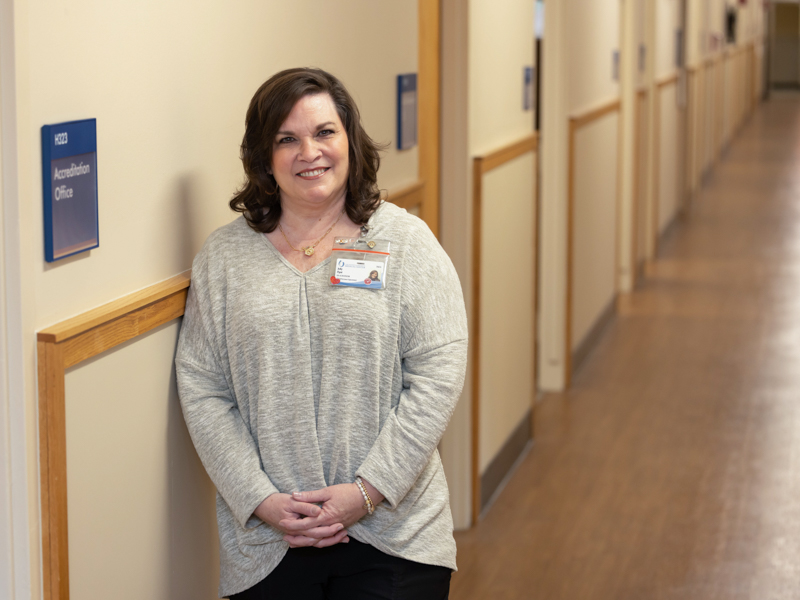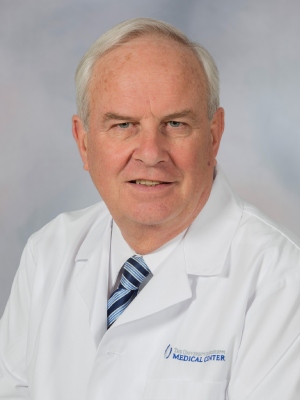When accreditation’s on the line, Judy Flynt leads the charge

When the email comes at 7:15 a.m., the heart of dozens of University of Mississippi Medical Center employees might travel from their chest to their mouth.
But for Judy Flynt, the Medical Center’s director of accreditation in the Office of the Chief Medical Officer, a surprise visit with less than 30 minutes’ notice from The Joint Commission isn’t reason for alarm, but instead, for readiness.
Since 1993, Flynt has led UMMC’s hospital accreditation program. She has spent her days preparing the health system for the every-three-years visit by The Joint Commission, a global driver of quality improvement and patient safety that accredits health care organizations after surveying them to ensure they’re providing safe and effective care of the highest quality and value.

“Judy has spent the last 30 years developing relationships with leaders and front-line staff across the organization,” said Chief Medical Officer Dr. Michael Henderson. “These collaborative relationships have fostered an environment of continuous readiness to ensure a successful accreditation process.”
Flynt’s retiring Dec. 31 from a job that’s one of the most important on the Medical Center campus. She got her start at UMMC in 1991, when she was hired as quality assurance coordinator after earning a degree in health informatics and information management from the School of Health Related Professions. “I’ve laughed that I had my last day of class on Friday and started work that Monday. I hadn’t even been through graduation,” she said.
Leaving the job she’s held for decades “is surreal,” Flynt said. “We’re getting together a good transition plan.”
TJC, as it’s called, sets tough but fair and necessary quality standards, assessing an organization’s performance and providing solutions and resources to support continuous improvement.
TJC’s surveyors evaluate and give input on critical areas that include infection control and prevention, such as hand washing, equipment cleaning and following manufacturer’s instructions; and how a health care organization provides an environment of care, patient safety and life safety, such as good fire safety processes and the many processes meant to keep patients safe from harm.
“For the longest time, the TJC scheduled their visits, but about 15 years ago, they started the survey being truly unannounced,” Flynt said. “The way we find out is that we have an extranet website with the TJC, and they will post our event on the morning that it’s going to happen at about 7:15. At that same time, they send an email to me and (Adult Hospitals Chief Executive Officer) Britt Crewse.
“They are in the parking garage by 7:45.”
Readiness for the site visit never ends. “You have to be prepared for all the things that need to happen. You have processes in place to make sure things move quickly, and that the people who need to know, know quickly,” she said.
“This is not dependent on one person. It’s so many people. It takes a real organizational effort and communication, that’s for sure.”
Flynt keeps up with TJC’s surveyors during a site visit of several days, and she emails at the end of each day what surveyors scrutinized and some of their initial findings that identify areas for improvement. Surveyors can assess any corner of the Medical Center that they want, be it checking at the end of a floor for doors unsafely propped open or scouring a ceiling for a light fixture, tile or a fire sprinkler system that is broken or astray.
And, surveyors have impromptu conversations with lots of people, asking questions about safety, quality, efficiencies and protocols and processes for care and other hospital operations. They examine the condition of buildings. “From a clinical perspective, they’re really looking at how you provide consistent and compliant care that is evidence-based and in line with industry standards,” Flynt said.
When the surveyors finish their visit, it’s reason for celebration – but not for long.
“That’s when the real work starts,” Flynt said. “They come back in 45 days to see if we have corrected deficiencies, and we only have that 45 days to do it. Within 60 days, we have to submit evidence of all of our corrective actions.”
The surveyors won’t come back for the first 18 months of the new three-year cycle, but they could come back in 18 months and one day. Generally, they come six to eight months before the three-year cycle ends, Flynt said – but don’t count on that.
“I have the dates up on my whiteboard. On Jan. 30, the window begins,” she said.
What some people might consider a stressful job has given Flynt joy. “It has been my life’s work. I loved learning and evolving with it,” she said. “I’ve loved helping the organization change to be up with the latest focuses from an accreditation perspective.
“We’ve always had good TJC surveys,” Flynt said. “My goal has always been to do the things that only I can do to make the process as seamless as possible, and the least intrusive that it can be.”
“As I have said many times before, accreditation keeps the doors open!” said Henderson, who also retires Dec. 31. “I would like to thank Judy for her dedication, expertise and commitment in fostering a patient-centered approach to accreditation.”
A Flowood resident and mom of a grown daughter, Flynt has been married for seven years to her high school sweetheart, Ricky Flynt, a wildlife biologist with the state Department of Wildlife, Fisheries and Parks. “I love to read books about the Low Country of South Carolina, and my husband and I love to travel,” Flynt said.
As she nears retirement, “folks have asked me what I’m going to do,” she said. “I am retiring without a plan. I’m going to spend time with my family, and travel without a timeline.”
Do you know a student, staff, volunteer or faculty member at the University of Mississippi Medical Center whose story would make an interesting feature or deserves to be recognized? Think about someone with outstanding job commitment, fascinating hobby or amazing accomplishment.
To nominate someone to be considered for a People of the U feature, just complete and submit this short form. If that person is picked for a feature, a member of the Communications and Marketing staff will contact him or her to learn more about his or her personal story.


